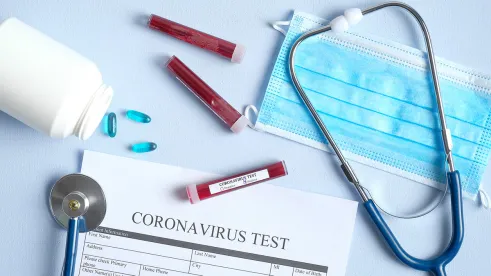Background
Coronaviruses are a common family of viruses, and one of the main causes of the common cold. In late December 2019, a new coronavirus was identified in China with the potential to cause severe respiratory illness. The disease caused as a result of infection by the new coronavirus has been named COVID-19. During 2020, the virus has spread throughout the world (including to the UK) and many people have developed COVID-19.
This note sets out the key health and safety obligations on employers that are relevant to the spread of the virus, and suggests practical steps that may be taken to mitigate the risks of liability.
Key Legal Duties
Health and safety law places duties on both employers and employees that are relevant to the risk posed by the virus.
Employer Duties
Under the Health and Safety at Work, etc. Act 1974 (HSWA), employers have the duty to safeguard, so far as is reasonably practicable, the health and safety of their employees at work, and persons other than their employees who may be affected by the employer’s undertaking.
The Management of Health and Safety at Work Regulations 1999 (Management Regulations) require employers to make a suitable and sufficient assessment of the risks to the health and safety of their employees at work and of persons other than their employees arising out of, or in connection with, their undertaking. The Management Regulations also require all employers to put in place appropriate arrangements for the planning, organisation, control, monitoring and review of those measures identified in the risk assessment as being necessary.
In addition to the statutory duties, employers will owe common law duties of care towards their employees, and persons other than their employees, who may foreseeably be affected by their undertaking.
Employee Duties
The HSWA requires all employees:
-
To take reasonable care for the health and safety of themselves and other persons who may be affected by their acts or omissions at work.
-
To co-operate with their employers so far as is necessary to enable them to comply with their health and safety duties.
Employees may also owe common law duties of care to their employers, other workers and other persons who they may encounter as part of their work.
In general, compliance with the various duties under health and safety law is best achieved by co-operation between employers and employees.
Implications for Employers
Therefore, employers are under a duty to ensure, so far as is reasonably practicable, that their employees, contractors, visitors to their premises and anyone else who may be affected by their undertaking are not exposed to the virus. What is reasonable in the circumstances will depend upon the facts. For example, an employer will generally be required to take greater action to safeguard its employees from COVID-19 than someone who only fleetingly visits their premises.
As a first step, employers should formally assess the risk posed by COVID-19. They should then start putting in place proportionate arrangements (according to the results of the risk assessment) to reduce the risk so far as is reasonably practicable.
Basic Practical Measures
As a minimum, employers should consider:
-
Checking official guidance on the virus on a daily basis.
-
Where they have overseas branches or offices, keeping up to date with the latest official guidance in the relevant countries.
-
Ensuring staff are made aware of the symptoms and kept informed of the latest medical and governmental advice on how to minimise the risk of infection (including how the virus spreads and how to reduce the risk of passing the virus on). This should also help to dispel any myths, fears and misconceptions.
-
Ensuring there are adequate handwashing facilities, soap, hand gel, tissues, etc.
-
Discussing with the facilities management what further measures could be taken to clean communal areas – especially frequently touched surfaces (e.g. door handles, canteen tables, lift buttons, etc.). There is guidance available from the Health and Safety Executive about controlling the risks.
-
Implementing a reporting procedure for anyone with symptoms, and anyone who has been in close contact with anyone else (such as family members) with symptoms.
-
Implementing a reporting procedure for individuals who have recently visited high-risk areas, such as China, Iran, Italy, South Korea, etc. If a staff member has recently returned from such an area, this may mean that they have to “self-isolate”.
-
Factoring in risks associated with contractors or other visitors to their premises, and making sure that contractors or visitors agree to observe whatever rules are in place to manage the risks.
-
Ensuring that when employees visit other places of work, the person in control of those premises has proper procedures in place to control the risk from COVID-19.
-
Risks from goods imported from high-risk areas, and whether updated handling and storage policies are appropriate.
You should ensure that any control measures that you put in place are aligned with the government’s latest advice. However, one should not overreact – if one cough leads to entire premises being closed immediately, that will feed fears and make it harder to argue that an employee’s refusal to attend work on these grounds is unreasonable.
Travel
Most employers are reducing all but essential international business travel. However, where international travel is required, employers should follow the official Foreign and Commonwealth Office’s guidance for the country in question. You should also refer to the official government guidance in the destination country or countries (and any transit country or countries). In the event of a conflict between different sets of official guidance, it would be sensible to follow the stricter set. Before the travel begins, employers should ensure that adequate insurance cover is in place. You should also continue to monitor official guidance for the duration of the trip on a daily basis in case the threat level increases.
Excluding Liability
An employer may consider asking employees or others to sign a disclaimer waiving their rights to bring any potential claim that they may have against it in respect of COVID-19, especially if they are travelling as part of their work. Signing a disclaimer may prompt people to take more responsibility for themselves and may deter anyone from making a claim in the first place. However, disclaimers such as these cannot abrogate an employer’s statutory health and safety duties and, under the Unfair Contract Terms Act 1977, are unenforceable should a civil claim be brought for personal injury (including disease) or death.
Testing
An employer cannot force an employee to undergo testing for COVID-19. However, where an employer has reasonable grounds to suspect that the employee may have caught it, the employer may ask them to be tested. If the employee were to refuse, the employer should explain that they have reasonable grounds and explain:
-
The employer’s duties under sections 2 and 3 of HSWA in relation to the health and safety of their employees and persons other than employees.
-
The employee’s own duties under section 7 of HSWA to take reasonable care for the health and safety of themselves and other persons, and to co-operate with the employer in relation to health and safety matters.
If the employee still refuses to undergo testing despite the reasonable grounds, the employer should consider whether disciplinary action should be taken against them. As the spread of the virus continues, the threshold for what constitutes “reasonable grounds” to suspect that someone has the virus may reduce.
Record Keeping
Employers should keep a record of what measures they have taken to reduce the risk to employees and persons other than employees from COVID-19 (including any steps that they have consciously decided not to take), and the reasons for doing so. The reason for doing so is two-fold:
-
An employer may in the future have to justify the decisions that it took during the outbreak (for example, in the course of a regulatory investigation or litigation), so having a clear, contemporaneous note explaining its approach may help to robustly defend its position.
-
Lessons can be learnt (for examples, as to which measures taken were effective) that can be used to formulate future crisis management planning.
Final Thoughts
Due to the rapid spread of the virus, official guidance as to what steps should be taken to tackle it is changing frequently. It is, therefore, important for employers to carry out regular (ideally, daily) reviews of their risk assessments and control measures.





 />i
/>i

